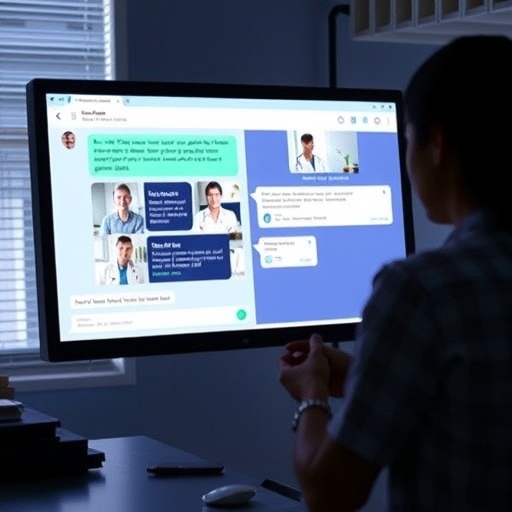In a rapidly evolving educational landscape, the integration of artificial intelligence tools such as ChatGPT has become a focal point for enhancing learning experiences among healthcare professionals. A recent study conducted in Taiwan offers compelling insights into how the utilization of ChatGPT can foster essential skills such as self-directed learning and critical thinking among nurses in both school and university settings. The research sheds light on the transformative potential of AI in nursing education, proposing that these advancements not only improve knowledge acquisition but also empower future healthcare practitioners to make informed decisions in their clinical practices.
As education increasingly pivots towards technology interconnectivity, this study, conducted by Chang et al., systematically explores the relationship between AI-assisted learning and cognitive skill enhancement. Conducted with a diverse cohort of nursing students and professionals, the research highlights the multifaceted benefits of engaging with AI tools like ChatGPT in both academic and clinical settings. The findings at the core of this investigation indicate a clear correlation between frequent use of ChatGPT and improved self-directed learning capabilities, suggesting that such AI tools can effectively support independent study practices.
Self-directed learning, a crucial component in nursing education, is defined as the ability of students to take initiative in their learning process actively. This competency is increasingly critical in the fast-paced healthcare environment where continual learning is essential for maintaining professional competency. The study identifies several dimensions of self-directed learning that were enhanced through the use of ChatGPT, such as goal-setting, self-monitoring, and self-evaluation. By employing AI assistance, nursing students not only engage with material more effectively but also refine their ability to assess their learning processes.
Moreover, the study outlines how ChatGPT has the potential to facilitate critical thinking among nursing professionals. Critical thinking is essential in nursing practice as it enables practitioners to analyze scenarios, weigh evidence, and apply appropriate interventions based on their assessments. The research findings indicate that when using ChatGPT, participants demonstrated increased capability to evaluate information and articulate complex clinical decisions. This shift toward improved critical thinking skills through technology has significant implications for the quality of patient care in increasingly complex healthcare environments.
With the ongoing advancement of AI tools in educational curricula, the study raises pertinent questions regarding the preparedness of educators to integrate these technologies into their teaching methodologies effectively. The respondents provided insights into their experiences, revealing that understanding how to leverage AI capabilities became a pivotal part of their learning journey. Many participants emphasized the need for foundational training in using such tools to maximize their impact on educational outcomes, underscoring the need for curriculum development that incorporates digital literacy alongside nursing skills.
Furthermore, Chang et al. examined the barriers that hindered nurses from fully leveraging ChatGPT for their learning enhancement. The feedback pointed towards a resistance rooted in uncertainty about the reliability of AI-generated information. Many students expressed hesitance in trusting AI outputs due to perceived gaps in accuracy and relevance to their clinical practices. As a result, the study highlights the necessity for educational institutions to provide guidance on the responsible use of AI technologies and to reinforce the critical evaluation of information sourced from these platforms.
In conclusion, the evidence presented in this study indicates a promising relationship between ChatGPT usage and the development of self-directed learning and critical thinking skills among nursing professionals in Taiwan. This research lays the groundwork for further exploration into how AI tools can be best utilized to enhance educational outcomes across various disciplines. As the integration of technology in education continues to expand, nursing programs worldwide must consider how these AI advancements can be woven into their pedagogical frameworks to prepare future healthcare providers effectively.
The future of nursing education thus seems intertwined with the advancement of AI technologies like ChatGPT, which not only have the potential to enrich the learning experience but also to transform how nurses approach their professional challenges. Hospitals and educational institutions alike must stay abreast of these developments, implementing targeted training programs that equip nursing students with the necessary skills to thrive in an increasingly digital world. The implications of this study are substantial, serving to motivate future research and inform educational practice, establishing a foundation for a generation of nurses who can adeptly navigate the complexities of modern healthcare environments.
As we venture further into the technological era, the relevance of studies like these cannot be overstated. They not only illuminate current practices but also inspire future inquiry and adaptation in nursing education, ensuring that the healthcare workforce remains competent, adaptive, and ready to face the challenges of an ever-evolving industry. By fostering essential skills through innovative methods, the nursing profession can enhance its impact on patient care and health outcomes globally.
In summary, the integration of AI tools such as ChatGPT into nursing education represents a significant opportunity for innovation and improvement. As evidenced by the rich findings of Chang et al., this approach not only nurtures vital competencies in self-directed learning and critical thinking but ultimately prepares a new generation of nurses for the demands of modern practice. Continued exploration and adaptation will be essential as the profession navigates the intersection of education and technology, ensuring that nursing remains at the forefront of health and patient-centered care.
Subject of Research: Relationships between ChatGPT use with self-directed learning and critical thinking among school and university nurses in Taiwan.
Article Title: Relationships between ChatGPT use with self-directed learning and critical thinking among school and university nurses in Taiwan.
Article References:
Chang, LC., Hung, LL., Liu, TW. et al. Relationships between ChatGPT use with self-directed learning and critical thinking among school and university nurses in Taiwan.
BMC Nurs 24, 1426 (2025). https://doi.org/10.1186/s12912-025-04069-7
Image Credits: AI Generated
DOI: https://doi.org/10.1186/s12912-025-04069-7
Keywords: ChatGPT, self-directed learning, critical thinking, nursing education, artificial intelligence, Taiwan.




